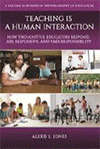
Teaching is a Human Interaction
How Thoughtful Educators Respond, Are Responsive, and Take Responsibility
By:
Alexis L. Jones, Eastern Illinois University
A volume in the series: Studies in the Philosophy of Education. Editor(s): John E. Petrovic, The University of Alabama.
Published 2023
This book contains an argument supported by education philosophers as well as composite stories, data, and personal experiences. The author mentions a number of scholars (e.g., Benjamin, 1988; Buber, 1970; Noddings, 2005, 2013; Palmer, 1983; van Manen, 1986, 1991, 2000) who address important human issues in the field of education, and she ties their work and hers to show common themes within the issues of care, responsivity, and relational ethics.
The first part of the book (Introduction and Chapters 1-3) is primarily philosophical, and the author shares the thoughts of the aforementioned scholars and others on topics relating to the very human work teachers do. The next section of the book (Chapters 4-6) combines theoretical works and empirical data to address the complexity and humanity of teaching.
While the work described in the aforementioned chapters may appear to present an idea of ethical teacher perfection, this is not the case. Teachers are not supposed to be, nor are they logistically able to be, all things to all children. The final chapter instead addresses how stakeholders (e.g., educators, administrators, parents) can gently move our traditional education system toward this ideal. This conclusion shares the ways teachers and teacher educators can conceptualize the work on teaching-as-human-interaction and use it to improve the teaching perception.
ENDORSEMENTS:
"Readers of this superb book will be convinced by the end of it that kindness and care are fundamental to good teaching. Based on vast teaching experience and a philosophy of care ethics, Alexis Jones portrays teaching as a far ‘messier’ human interaction than is ever formally recognized. Using scholarly debate and wonderfully narrated examples, the book advocates an ethics of care for teachers navigating interminable choices in almost every moment. But beware thinking that teaching-the-Alexis-Jones-way is a soft option. Quite the contrary, striving similarly for academic attainment and caring teacher – student relationships involves challenging endeavors for both teacher and student alike." — David Walker, The University of Alabama
CONTENTS
Introduction. CHAPTER 1: Care and Relational Knowing. CHAPTER 2: Relational Ethics: Leading the Child. CHAPTER 3: Nice Versus Kind. CHAPTER 4: Being and Becoming. CHAPTER 5: Noticing, Attunement, Recognition, and Being Seen. CHAPTER 6: Once Confronted, the One-Caring Must Respond. CHAPTER 7: Imperfections: A Need for Reflection and Introspection. References. About the Author.
-
Paperback979-8-88730-148-8
Web price: $45.04 (Reg. 52.99)
-
Hardcover979-8-88730-149-5
Web price: $80.74 (Reg. 94.99)
- eBook979-8-88730-150-1

- EDU053000 - EDUCATION: Training & Certification
- EDU059000 - EDUCATION: Teacher & Student Mentoring
- EDU040000 - EDUCATION: Philosophy & Social Aspects
-
 Blame Teachers
The Emotional Reasons for Educational Reform
Blame Teachers
The Emotional Reasons for Educational Reform
-
 Conceptualizing Truth
Implications for Teaching and Learning
Conceptualizing Truth
Implications for Teaching and Learning
-
 Dystopia & Education
Insights into Theory, Praxis, and Policy in an Age of Utopia-Gone-Wrong
Dystopia & Education
Insights into Theory, Praxis, and Policy in an Age of Utopia-Gone-Wrong
-
 Love in Education & the Art of Living
Love in Education & the Art of Living
-
 Problematizing the Profession of Teaching from an Existential Perspective
Problematizing the Profession of Teaching from an Existential Perspective
-
 Technologies of Government
Politics and Power in the "Information Age"
Technologies of Government
Politics and Power in the "Information Age"
-
 The Fear Problematique
Role of Philosophy of Education in Speaking Truths to Powers in a Culture of Fear
The Fear Problematique
Role of Philosophy of Education in Speaking Truths to Powers in a Culture of Fear

